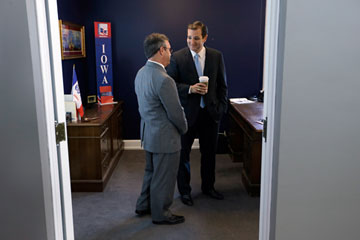
Visits to key primary states like Iowa suggest Cruz has an eye on 2016.
(2 of 4)
From the beginning, it was clear Cruz was a little different. He was raised in Houston, the product of an Irish-Italian mother from Delaware and a Cuban father who fled the Batista dictatorship in 1957, arrived in Austin with $100 sewn into his underwear and washed dishes for 50¢ an hour to put himself through college. In 1984, when Ted was 13, his parents enrolled him in an after-school program that extolled the virtues of free-market economics. He learned to memorize the Constitution with a mnemonic device and joined a performance troupe that toured the area, wowing audiences by scrawling its text on easels.
At Princeton, Cruz became the top-ranked debater in the U.S. "He'd keep me up into the early-morning hours, working out what we could have done better," says his debate partner, David Panton. "And that was when we won." In a twist so fitting it sounds apocryphal, one rare loss came when he was forced to argue against the proposition that the U.S. was the greatest nation in the history of the world. When Cruz turned in his senior thesis, an interpretation of the Ninth and Tenth Amendments, his adviser, conservative scholar Robert George, felt moved to scribble a C-plus on the paper's cover to impart a fleeting sensation of failure. "When you folded back the corner of the page," George recalls, it revealed the A. "It was a mean thing to do, but Ted was the kind of student who had never gotten below an A-minus in his life."
Cruz went to Harvard Law School, clerked for Chief Justice William Rehnquist at the Supreme Court and advised George W. Bush's 2000 presidential campaign on legal issues before becoming solicitor general of Texas. Despite the glittering résumé, he was a rounding error in the polls when he jumped into the 2012 Texas Senate race. The prohibitive front runner was Lieutenant Governor David Dewhurst, a Republican with a deep war chest and the backing of the Lone Star State political machine.
But as Cruz worked his way through the state, he won the attention of fundraising networks like FreedomWorks and the Club for Growth. "He was being told everywhere he went that he had no chance to win," says Heritage Foundation president Jim DeMint, a former Senator who gave Cruz an early endorsement. It was the most expensive Senate primary of 2012, and Cruz was outspent about 3 to 1. He won by 14 points.
In another era, Cruz might have seen the Senate as a platform to write laws and forge alliances. Instead he views it as a "battlefield." He announced his arrival with a bruising cross-examination of fellow Republican Chuck Hagel, Obama's nominee for Defense Secretary. Cruz demanded additional financial disclosures from the former Senator, suggesting Hagel had earned honorariums from hostile foreign powers. The performance led Democrats to liken Cruz--who in 2010 gave a speech declaring there were a dozen communists on the Harvard Law faculty--to Joe McCarthy.
